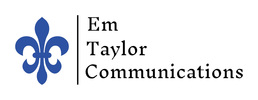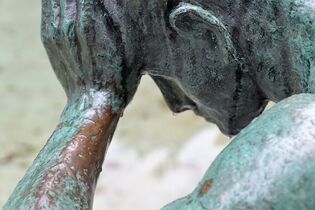This morning, I interviewed with Richie T. on BYU Radio's Lisa Show about managing conflict while we're in pain (physical, emotional. or otherwise). While fairly obvious, when we are trying to manage conflicts while personally experiencing pain, we are less nuanced in our reactions to additional conflicts. Rather than taking the time to gather more information, talk with others, or wait for the best time and situation for resolution, we may gravitate toward reactions that tend to exacerbate conflict quickly and dramatically.
For example, if you ask me to help carry in the groceries for you right after I stubbed my toe against the door, I am less likely to graciously respond to your request and more likely to shout back, "I've already been doing everything in the house today. Do it yourself!" My energy is already focused on nursing my hurt toe and not trying to manage your expectations for how I help around the house (a different source of conflict). Okay, so that's just a toe stub, but still, you get my point.
When we're personally experiencing pain, we may be quicker to either steamroll through our conflicts or ignore them entirely; we tend to be hot or cold. Our reactions may be more dramatic because we are already using energy to manage our pain and don't filter our reactions as easily. Being socially graceful and adept takes mental and emotional energy, which may be in shorter supply. As a result, rather than speed up, we do well to slow down and break down steps to a process whether we're the ones in pain, or whether we are trying to help others who are experiencing conflict while in pain.
As helpers to those experiencing pain and conflict, we benefit from withholding (1) judgement for why that person is experiencing pain and additional conflicts, (2) taking over the conversation with our own apparent empathetic stories relating our own handling of a similar conflict, and (3) imposing a value-laden triage of how the other person should handle their conflict based on our experience. In short, when we are approached by others who are experiencing both pain and additional conflicts, we need to guard against giving advice too freely based on our experience of pain and suffering. We demonstrate great love when we avoid imposing our value triage on the conflicts others are facing unless they ask us for our insights. Even when asked, we remain tentative about imposing a certain type of solution because we know that ultimately each person is responsible for his or her choices.
Finally, imagine that a strong and courageous friend approaches you while carrying a 50 pound bag of rocks on her back. You've seen her carrying around this bag of rocks for weeks. You can see the strain, stress, and pain in the crease lines on her face. While she talks with you, she rubs her shoulder anxiously with one hand while she braces the bag on her alternate hip. She tries to loosen her neck a bit, but she's still holding that bag of rocks on her back so it's nearly impossible to find relief. You ask her if you can carry the bag for her, but she says that she can't hand it over; that it's her's to carry.
You are uncomfortable watching her carry this load all by herself. She is insistent that she can't let go of it. But, then you ask if you can help her hold it while she talks with you. She says that might be all that she needs in order to go on with carrying her burdens. You stand in close proximity and help her hold up the load while she shares the cares and worries that press down on her mind constantly. Together you are both able to manage the load and hold the conversation. She finishes expressing her thoughts and thanks you for caring enough to hold the load with her while she shared what's in her heart.
Sometimes, just helping hold the load while others are in pain, provides the other person with the opportunity to focus just enough attention and adequate energy on taking the first steps toward healing. We are social creatures in need of each other despite the differing burdens we carry. I hope that we will not underestimate the power of even temporarily shouldering others' burdens so that they can process through the challenges they face both in terms of pain and other types of conflicts.
For example, if you ask me to help carry in the groceries for you right after I stubbed my toe against the door, I am less likely to graciously respond to your request and more likely to shout back, "I've already been doing everything in the house today. Do it yourself!" My energy is already focused on nursing my hurt toe and not trying to manage your expectations for how I help around the house (a different source of conflict). Okay, so that's just a toe stub, but still, you get my point.
When we're personally experiencing pain, we may be quicker to either steamroll through our conflicts or ignore them entirely; we tend to be hot or cold. Our reactions may be more dramatic because we are already using energy to manage our pain and don't filter our reactions as easily. Being socially graceful and adept takes mental and emotional energy, which may be in shorter supply. As a result, rather than speed up, we do well to slow down and break down steps to a process whether we're the ones in pain, or whether we are trying to help others who are experiencing conflict while in pain.
As helpers to those experiencing pain and conflict, we benefit from withholding (1) judgement for why that person is experiencing pain and additional conflicts, (2) taking over the conversation with our own apparent empathetic stories relating our own handling of a similar conflict, and (3) imposing a value-laden triage of how the other person should handle their conflict based on our experience. In short, when we are approached by others who are experiencing both pain and additional conflicts, we need to guard against giving advice too freely based on our experience of pain and suffering. We demonstrate great love when we avoid imposing our value triage on the conflicts others are facing unless they ask us for our insights. Even when asked, we remain tentative about imposing a certain type of solution because we know that ultimately each person is responsible for his or her choices.
Finally, imagine that a strong and courageous friend approaches you while carrying a 50 pound bag of rocks on her back. You've seen her carrying around this bag of rocks for weeks. You can see the strain, stress, and pain in the crease lines on her face. While she talks with you, she rubs her shoulder anxiously with one hand while she braces the bag on her alternate hip. She tries to loosen her neck a bit, but she's still holding that bag of rocks on her back so it's nearly impossible to find relief. You ask her if you can carry the bag for her, but she says that she can't hand it over; that it's her's to carry.
You are uncomfortable watching her carry this load all by herself. She is insistent that she can't let go of it. But, then you ask if you can help her hold it while she talks with you. She says that might be all that she needs in order to go on with carrying her burdens. You stand in close proximity and help her hold up the load while she shares the cares and worries that press down on her mind constantly. Together you are both able to manage the load and hold the conversation. She finishes expressing her thoughts and thanks you for caring enough to hold the load with her while she shared what's in her heart.
Sometimes, just helping hold the load while others are in pain, provides the other person with the opportunity to focus just enough attention and adequate energy on taking the first steps toward healing. We are social creatures in need of each other despite the differing burdens we carry. I hope that we will not underestimate the power of even temporarily shouldering others' burdens so that they can process through the challenges they face both in terms of pain and other types of conflicts.


 RSS Feed
RSS Feed